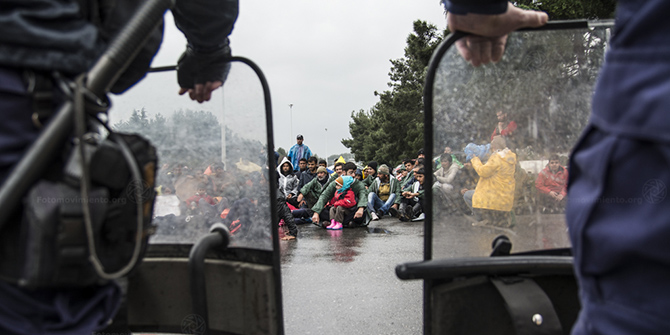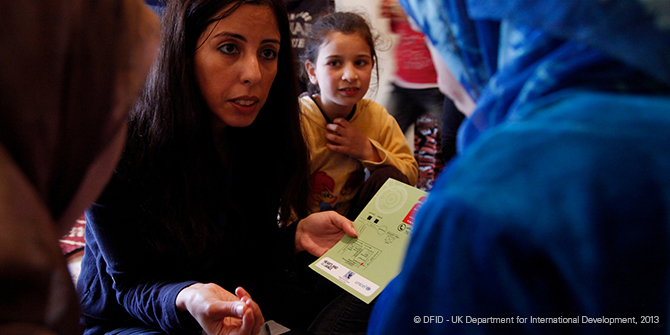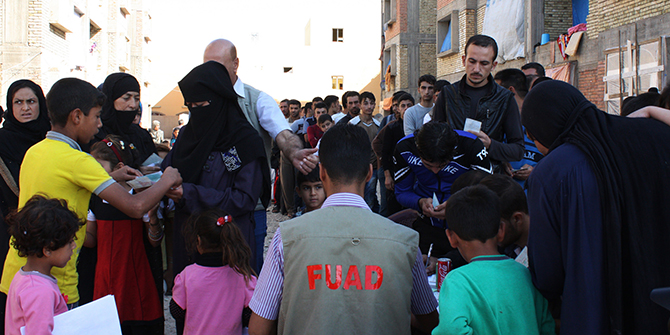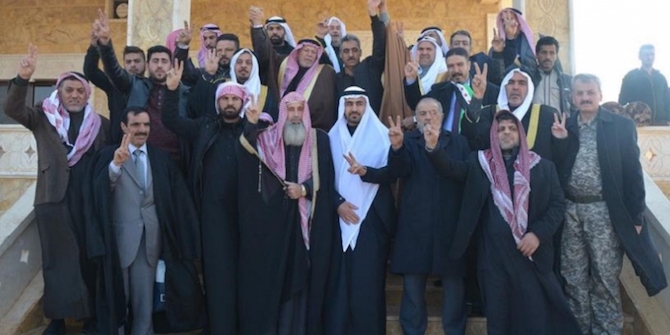by François Reybet-Degat
#LSERefugees
This paper was presented at a workshop on ‘The Long-term Challenges of Forced Migration: Local and Regional Perspectives from Lebanon, Jordan and Iraq’ organised by the LSE Middle East Centre in June 2016. It was published as part of a collected papers volume available in English and Arabic.

Forced Displacement: An Increasingly Prominent Global Issue
In recent years, forced displacement has become an increasingly prominent global issue. The changing scale, complexity and rapid pace of evolution of forced displacement have challenged governance at the global, regional and country levels. There is an increasing recognition of the need to address the underlying causes of movements, to better protect those on the move, to mitigate growing regional security concerns, and to find improved ways of funding international aid for the prevention of conflicts and addressing the consequences of forced displacement.
Ten years ago, there were 38 million people displaced by conflict, today there are over 65 million. While the world is witnessing an increase in new conflicts, old ones are not being resolved. Durable solutions are few and far between: globally, less than 1 percent of refugees are resettled to a third country; and the number of returning refugees has remained rather low in recent years. As a result, major refugee displacement crises last for an average of 17 years.
Many reckon that in a world generating $78 trillion in annual global wealth, insufficient resources have been devoted to preventing conflict and adequately addressing the consequences of forced displacement. The world humanitarian aid budget for 2014 was the largest ever recorded, but it also created the biggest shortfall in history, with just 62 percent of the total needs identified by its annual appeals process actually being funded.
The world and the UN recognise the fact that forced displacement has become a priority global issue deserving urgent attention, an issue now finding the place it deserves in the agendas of the Group of Seven (G7) and the Group of Twenty (G20) meetings and UN International conferences. In 2016 alone such important high-level summits include the London Conference on Supporting Syria and the Region held in early February, the 30 March High-Level Summit on Resettlement and Alternative Pathways of Admission for Syrian Refugees, the World Humanitarian Summit, the upcoming September UN High-Level Summit on Large-Scale Movements of Refugees and Migrants and President Obama Leaders’ Summit on Refugees.
A Region in the Eye of the Forced Displacement Storm
There are 19.5 million displaced people in the Middle East and North Africa region, which continues to host a disproportionate number of conflicts, with the Syrian crisis the largest refugee emergency since World War II.
Whilst over 500,000 Syrian refugees have reached the shores of Europe since 2015, the overwhelming majority of Syrian refugees, 4.8 million, are still in the Middle East region, of whom 253,000 were registered in 2016. There are 13.5 million people in need inside Syria, of whom 6.5 million are internally displaced persons (IDPs). In Lebanon, one in four persons is a refugee. If the European Union and its over 500 million population were to host a similar proportion of Syrian refugees, this would mean 125 million Syrian refugees in Europe. This number is to be contrasted with the total number of application for asylum in the EU in 2015: 1.26 million …continue reading
Download the paper in English | Download the paper in Arabic
François Reybet-Degat is UNHCR Deputy-Director for the Middle East and North Africa (Syria and Iraq Situations).
Other papers in the series
- Syrian Refugees in Lebanon: A Turning Point?
Mireille Girard
- Syrian Refugees and the Kurdistan Region of Iraq
Hayder Mustafa Saaid
- Iraqi and Syrian Refugees in Jordan Adjusting to Displacement: Comparing their Expectations towards UNHCR and their Capacities to use their Educational Assets
Géraldine Chatelard
- The Informal Adaptive Mechanisms among Syrian Refugees and Marginalised Host Communities in Lebanon
Nasser Yassin & Jana Chammaa
- Relations Between UNHCR and Arab Governments: Memoranda of Understanding in Lebanon and Jordan
Ghida Frangieh
- The Syrian Humanitarian Disaster: Understanding Perceptions and Aspirations in Jordan, Lebanon and Turkey
Dawn Chatty






